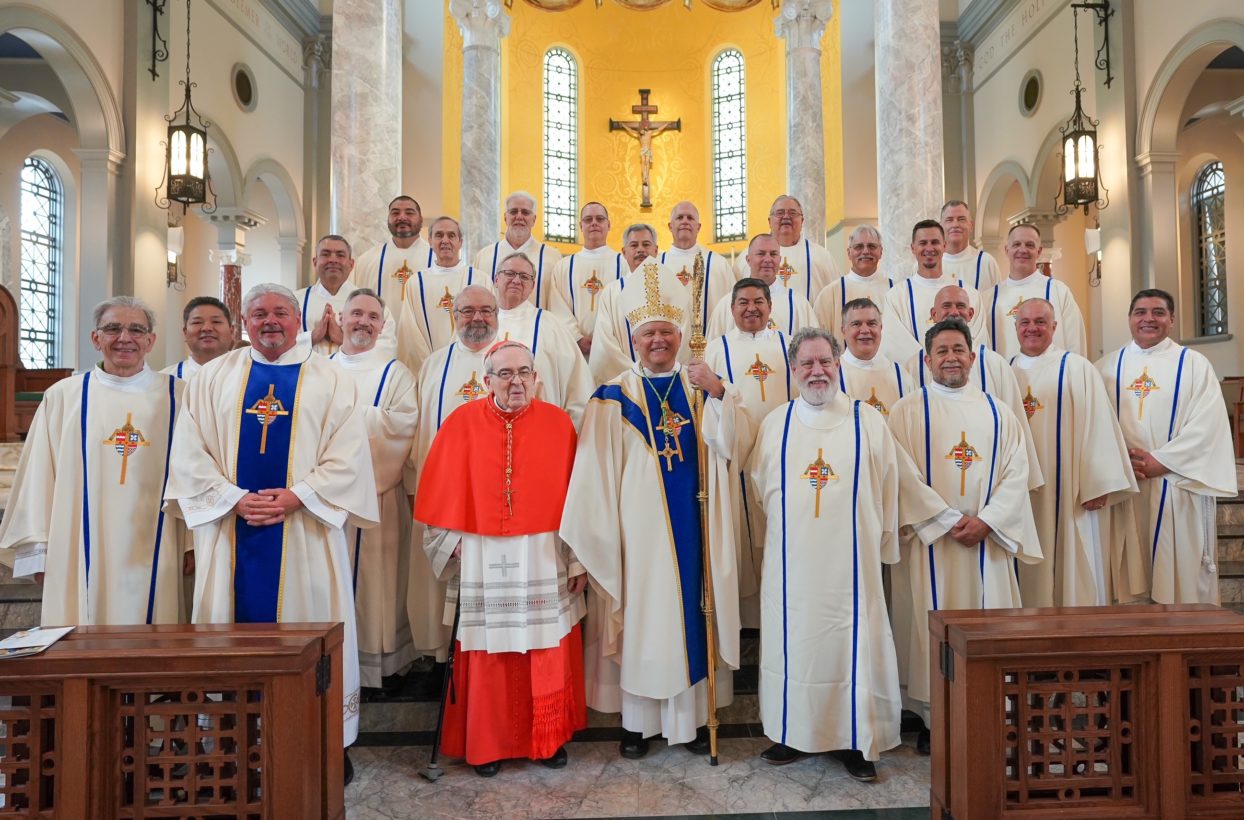23 men are ordained by Bishop Stika at the Cathedral of the Most Sacred Heart of Jesus
By Dan McWilliams
On a historic day for the Diocese of Knoxville, Bishop Richard F. Stika ordained 23 men to the permanent diaconate June 11, the diocese’s third such class since the first in 2007.
Bishop Stika used the word “spectacular” to describe the standing-room-only Cathedral of the Most Sacred Heart of Jesus, and the word might also have applied to the sight of the 23 men lying prostrate before the altar during the Litany of the Saints, or to the procession one-by-one as each man went forward for the laying on of hands and the prayer of ordination.
Several of the new deacons, interviewed afterward, called the Litany of the Saints the most powerful moment of the Mass for them as they completed their journey of more than five and a half years from the beginning of their studies to ordination.
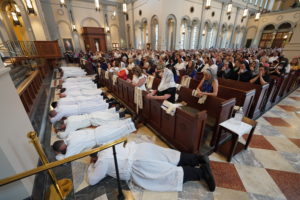 Concelebrating the ordination Mass were cathedral rector Father David Boettner, Father Peter Iorio, Father Michael Cummins, and Father Doug Owens. Cardinal Justin Rigali attended in choir. Miracle man Deacon Ken Conklin, the 24th member of the deacon class, who was ordained last fall when it was thought he was dying of cancer, was deacon of the Word at the ordination of his fellow men. Deacon Vic Landa was deacon of the Eucharist. Deacon Walt Otey was master of ceremonies. More than 30 priests and more than 30 of the already-ordained permanent deacons took part in the Mass.
Concelebrating the ordination Mass were cathedral rector Father David Boettner, Father Peter Iorio, Father Michael Cummins, and Father Doug Owens. Cardinal Justin Rigali attended in choir. Miracle man Deacon Ken Conklin, the 24th member of the deacon class, who was ordained last fall when it was thought he was dying of cancer, was deacon of the Word at the ordination of his fellow men. Deacon Vic Landa was deacon of the Eucharist. Deacon Walt Otey was master of ceremonies. More than 30 priests and more than 30 of the already-ordained permanent deacons took part in the Mass.
“There is nothing more spectacular than when a cathedral is filled, filled with friendship and love and faith,” the bishop said in his opening remarks. “For we gather together in the name of Our Lord Jesus to give fitting homage to God, inspired by the Holy Spirit, to be with these men and their families as they make a commitment of service and witness to the Diocese of Knoxville and to the greater Church scattered throughout the world. In the name of his Eminence, I welcome you all to this special moment, this shine of the diamond that we call the Diocese of Knoxville.”
The rite of ordination began after Deacon Conklin proclaimed the Gospel. Diocesan chancellor Deacon Sean Smith called forth each candidate individually, and each answered “present.” Deacon Tim Elliott, diocesan director of the diaconate, told Bishop Stika that the candidates “have been found worthy.”
“Relying on the help of Our Lord God and Our Savior, Jesus Christ, we choose these our brothers for the order of the diaconate, thanks be to God,” Bishop Stika replied.
In his homily, the bishop said those filling the cathedral “represent the thousands of people who belong to the Roman Catholic Diocese of Knoxville in East Tennessee—big parishes, small parishes, missions. But we’re here at the invitation of the Church, at the invitation of Our Lord Jesus Christ, and in some ways at the invitation of St. Paul VI, who reinstituted the office of the diaconate in 1977. For a long time, it was part of the road to priesthood, and so my brother priests and the cardinal and myself were all in that moment when we, too, can remember being ordained a deacon.”
Bishop Stika referred to a retreat he attended with the deacons shortly before their ordination.
“We gather together this day to witness a change in these men, an ontological change through the laying on of my hands that has existed for centuries. I had a delightful time about a month ago of spending an entire week with these men,” he said. “I don’t know if they saw it as good as I did because they had to listen to me, but to experience these men and to experience the stories that they told, what brought them to this moment when all of a sudden they said, ‘I do. I am present. I am here,’ whether it was as engineers or military, scientists, laborers, transportation industry—whatever it might be, they present a totality of themselves to the Church, to all of us, for this is indeed a sacred time.
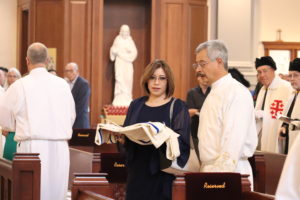 “In a few moments I’m going to be asking them questions about faithfulness, about prayer, about celibacy—nope, nope, not celibacy. I’m sorry about that. That was a few weeks ago [at the ordination of transitional deacons]. Maybe the wives might like that; I don’t know. Then at some point we’re going to invoke the saints to be with us, the Church of Knoxville, and then the laying on of hands and the presentation of the Scriptures, the vesting—what a wonderful time.”
“In a few moments I’m going to be asking them questions about faithfulness, about prayer, about celibacy—nope, nope, not celibacy. I’m sorry about that. That was a few weeks ago [at the ordination of transitional deacons]. Maybe the wives might like that; I don’t know. Then at some point we’re going to invoke the saints to be with us, the Church of Knoxville, and then the laying on of hands and the presentation of the Scriptures, the vesting—what a wonderful time.”
The bishop said he had been researching online for Church documents related to the diaconate.
“I kind of strayed off from the documents to some words of St. Benedict that I think sum it all up: ‘To pray and to work.’ To me that’s the diaconate, that’s the priesthood, that’s the episcopate,” he said. “That is true for all of us, but to pray and to work. You’re going to make commitments to pray with the Church and for the Church, in the Liturgy of the Hours, before the Blessed Sacrament, leading people in your parishes to pray, praying with your family, and then having that ongoing conversation with God. To be at the liturgy, the Eucharist, the summit of what we do as a Church, to assist the minister or the priest or the bishop. To bury the dead, to baptize, to witness. Powerful things: prayer and work.
“But also work—you all have jobs or you might be retired and you have joined the honey-do club, when your wife says, ‘Honey, please do this and please do that.’ And you might be called to do other things in the diocese—hospital ministry, formation, catechetical instruction, RCIA, whatever it might be. Prayer and work—if you miss one or the other, it’s incomplete, for we cannot be deacons, we cannot be priests, we cannot be a bishop without the gift of prayer, the ongoing conversation with God, for without that your work as a deacon will be empty. It will be empty and confusing. You might become a human robot, just doing the actions.”
Bishop Stika told the deacon candidates to “always remember that what you do, especially in the liturgy, is sacred because it’s of God, but also you are called to lead people to God. One of those things associated with the diaconate is charity. In the early Church, the presbyters were busy doing all kinds of things, and they knew something was missing, so the evolution came of the presbyterate, the episcopate, and the diaconate. The permanent diaconate for so many centuries was lost.”
Becoming clergy is an ontological change, the bishop said.
“What a beautiful thing that is. Never forget God has chosen you to do something significant. Not to be placed on a pedestal, not to give orders to everybody else but to be a servant,” he said. “Sometimes that word ‘servant’ is misunderstood, for we don’t live in a world of servants, unless you’re wealthy and you might have a valet or something. But to be a servant, to be open to the invitation of Christ in charity, in prayer, and in work, to help build the kingdom of God on this earth that He has given to us.”
Bishop Stika mentioned the study courses the 23 men had at the Christ Prince of Peace Retreat Center in Benton.
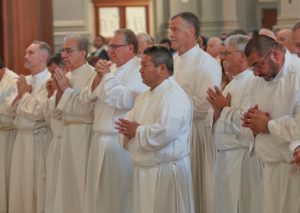 “I admire you men and your families because many of you have fulltime jobs, and during those courses at the retreat center, some had to drive a long distance one way and the other way for a weekend,” he said. “But the thing I admired about this class, and I’ve probably said it about other classes: you’re friends. There’s a unity and an enjoyment, no hesitancy to speak your mind. And that part of your formation, led by Deacon Tim Elliott, whom I’m so grateful for, and the other formators, those who came to instruct and to share the gift of Scripture, sacrament, liturgy, even canon law, has made you who you are today.
“I admire you men and your families because many of you have fulltime jobs, and during those courses at the retreat center, some had to drive a long distance one way and the other way for a weekend,” he said. “But the thing I admired about this class, and I’ve probably said it about other classes: you’re friends. There’s a unity and an enjoyment, no hesitancy to speak your mind. And that part of your formation, led by Deacon Tim Elliott, whom I’m so grateful for, and the other formators, those who came to instruct and to share the gift of Scripture, sacrament, liturgy, even canon law, has made you who you are today.
“More so now, you’re a public person. And people will watch, and they will listen. Give them the kernel of truth, the kerygma, when you preach, not your own opinion, but when you preach as you have studied the Scriptures and then brought together life experiences to proclaim Jesus and the teachings that are articulated by the magisterium. Respect and obedience. … The obedience is not to the bishop. In some ways, yes. ‘Hey, I want you to go here or go there.’ The obedience is to the Church—magisterial teaching, the Scriptures, reflection, prayer, charity—that’s what the Church asks you to do. It does, and Christ demands it. So, in a few moments I’ll pose these questions to you, and hopefully you’ll all say, ‘I do’ or ‘I am.’ I know Father David Boettner behind me, the rector here at the cathedral, his question is, ‘Are we taking up a collection today?’ That’s a practical question.”
The bishop thanked the deacons’ families.
“To the wives, thank you. To the families, thank you. They always say that the first seminary is in the home. To the wives and to the family, you have been part of the formation of these men. And if your parents are here or brothers and sisters, siblings, the same is true. So that’s why today the Church of the Diocese of Knoxville, the Catholic Church of East Tennessee, rejoices for this moment of history, now the third class of the permanent diaconate. God bless you and be with you and fulfill you, and know He has chosen you for this moment, and you have said yes. Amen.”
Before the elect made their promises to the bishop, the diocese’s shepherd made one observation as he saw the 23 men filling the area around the altar steps.
“We’re going to need a bigger cathedral, I think,” he said.
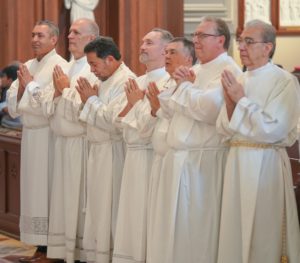 The candidates pledged before Bishop Stika “to be consecrated for the ministry of the Church by the laying on of [the bishop’s] hands and the gift of the Holy Spirit”; “to discharge with humble charity the office of the diaconate, so as to assist the priestly order and to benefit the Christian people”; “to hold fast to the mystery of the faith with a clear conscience, as the Apostle says, and to proclaim this faith by word and deed according to the Gospel and the Church’s tradition”; “to guard and increase the spirit of prayer proper to your way of life and, in keeping with this spirit and the circumstances of your life, to celebrate faithfully the Liturgy of the Hours, with and for the people of God and indeed for the whole world”; and “to conform your manner of life always to the example of Christ, whose Body and Blood you will handle at the altar.”
The candidates pledged before Bishop Stika “to be consecrated for the ministry of the Church by the laying on of [the bishop’s] hands and the gift of the Holy Spirit”; “to discharge with humble charity the office of the diaconate, so as to assist the priestly order and to benefit the Christian people”; “to hold fast to the mystery of the faith with a clear conscience, as the Apostle says, and to proclaim this faith by word and deed according to the Gospel and the Church’s tradition”; “to guard and increase the spirit of prayer proper to your way of life and, in keeping with this spirit and the circumstances of your life, to celebrate faithfully the Liturgy of the Hours, with and for the people of God and indeed for the whole world”; and “to conform your manner of life always to the example of Christ, whose Body and Blood you will handle at the altar.”
Each candidate in turn then placed his hands in those of Bishop Stika, promising “respect and obedience to me and to my successors.”
The Litany of the Saints followed, as each candidate lay prostrate before the altar steps, praying for the saints of the Church to pray for them.
“Let us pray, dearly beloved, that God, the Almighty Father, will in His mercy pour out the grace of His blessing on these, His servants, whom He is pleased to receive into the sacred order of the diaconate,” the bishop said before the litany began.
The candidates then went forward individually for the laying on of hands and the prayer of ordination. The newly ordained deacons were then vested, by a priest or deacon friend, with a stole and dalmatic. Each new deacon then went forward to the bishop and formally received the Gospel book. “Receive the Gospel of Christ, whose herald you have become. Believe what you read, teach what you believe, and practice what you teach,” the bishop told each man.
In his closing remarks at Mass, the bishop thanked the families of all the new deacons as well as Deacon Conklin.
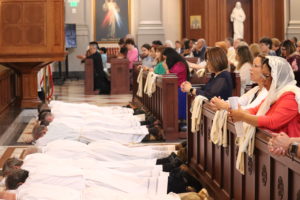 “For you guys, remember, Ken was the first one to be ordained in your class, so he’s the dean,” the bishop said, drawing a round of applause.
“For you guys, remember, Ken was the first one to be ordained in your class, so he’s the dean,” the bishop said, drawing a round of applause.
“I also want to thank Deacon Tim Elliott, who has been working so hard with these young men. It’s been a long process. Typically, to be ordained a priest, you go to seminary nine months of the year. These guys, over five and a half years, have given a weekend plus all the study involved, plus going through COVID and illness and all kinds of other things. It just shows their fortitude and their courage and their willingness to be of service to you, God’s people, to all the people that you represent as well.”
Two of the men ordained (Bob Denne, son Robert; Joe Herman, son Daniel) have sons who are in the seminary, the bishop said.
“Someday the deacon will have to call their son Father,” he said.
Newly ordained Deacon Bob Hunt, a columnist for The East Tennessee Catholic who works as a registered nurse, called it “a glorious feeling” to be ordained.
“I’m so excited. I’m eager to get started, eager to tell people about Jesus,” he said. “That’s why I’m doing this. That’s why I’ve wanted to do this. That’s why I’m here, and I’m hoping that God will give me the grace to do that and do it well.”
His inspiration during study “was the opportunity to serve the Church in formal ministry. There’s nothing I like better than getting up in front of people and telling them about Jesus. That’s what I want to do. The other men in the group, it was just wonderful getting together every month with two dozen other men who love Jesus, love the Church, and want to do good things with their lives,” Deacon Hunt said.
The long days of study seemingly had no end in sight.
“I almost hoped they wouldn’t end because we enjoyed them so much and the fellowship among the brothers,” Deacon Hunt said. “I’m glad the day is finally here, and I think all of us are ready to hit the ground running.”
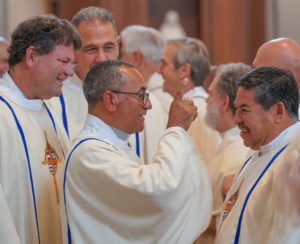 Father Bill McNeeley, pastor of Holy Ghost Parish in Knoxville, vested Deacon Hunt.
Father Bill McNeeley, pastor of Holy Ghost Parish in Knoxville, vested Deacon Hunt.
“He’s a good family friend. We have been good friends for 15 years at least,” the new deacon said. “He presided at the wedding of both my daughter Bernadette and my daughter Genevieve, and he baptized my grandbaby. We have lunch almost every month, so he’s a good family friend.”
The most notable moment of the Mass for Deacon Hunt was “bishop’s prayer that in receiving this divine commission may we receive divine assistance to fulfill it,” he said.
Deacon David Duhamel, a transportation security project manager at Oak Ridge National Laboratory, said that seeing ordination day come brought a sense of “relief after five years of hard work” and that it was “very humbling.”
His inspiration during all of that time was “my family. My wife, Anna, and my seven kids,” he said.
Regarding the years of study for the diaconate, Deacon Duhamel said, “There were times when it was questionable” whether they would ever end, “but through my fellow deacon candidates, they were my good friends, we walked together and it was very successful.”
Father Richard Armstrong vested him. “He was my spiritual director throughout the diaconate,” Deacon Duhamel said.
The most powerful moment of the Mass for Deacon Duhamel “was certainly lying on the floor in humility,” he said.
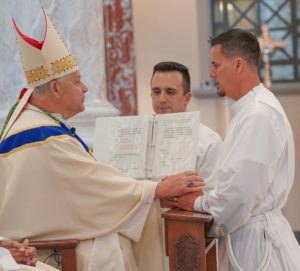 Deacon Chad Shields called his ordination “surreal.”
Deacon Chad Shields called his ordination “surreal.”
His inspiration through a time of “highs and lows” before ordination came from his spouse.
“My wife has been not just a support but a large reason why I’m Catholic to begin with,” he said. “A lot of prayer, a lot of listening to mentors, people who gave words of encouragement to stick with it and just trying to do the due diligence of discerning.”
With two young children, who keep him busy with homeschooling while he also runs a farm, Deacon Shields said, “I’m reminded of how fast time goes, and in some ways I wish that [the study time] was longer.”
His vestor was Deacon Patrick Murphy-Racey. “He was my spiritual director,” Deacon Shields said.
His most notable moment of the ordination was “probably the Litany of the Saints,” he said. “Especially as a convert, one of the wonderful things about Catholicism is the sense of community in our faith, and lying on the floor and considering how many brilliant minds and wonderful hearts have gone before us to give us the Church that we know today and that they are genuinely praying for us is a very powerful thought.”
Deacon Rafael Pubillones talked about finally seeing ordination day come.
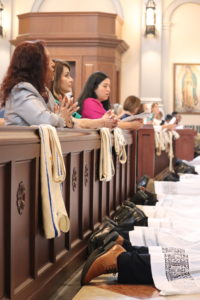 “I had a hard time holding back my tears, especially when we were prostrated and the Litany of the Saints was being chanted for us. I wasn’t the only one—I was able to hear other brothers sniffling” during the litany, he said.
“I had a hard time holding back my tears, especially when we were prostrated and the Litany of the Saints was being chanted for us. I wasn’t the only one—I was able to hear other brothers sniffling” during the litany, he said.
Deacon Pubillones’ inspiration was “several people, specifically those who had asked me if I had considered the diaconate, who were priests, who were deacons, who were sisters, and of course family. I’ve been telling them specifically today that I’m here because of them,” he said.
The weekends of study were not a toil for him, he added.
“Actually, I just love it—I couldn’t wait for the weekends, because for me it wasn’t homework per se because I love to read and I loved to read what I was reading,” he said.
Father Ray Powell, his pastor at St. Thomas the Apostle Parish in Lenoir City, was the vestor for Deacon Pubillones.
“He is one of my many mentors,” the new deacon said.
Deacon Pubillones retired from the Air Force after serving 27 1/2 years, then worked for Lockheed Martin for five years, where he was a business development manager in Washington, D.C., before moving to Tennessee in 2008. The most notable moment of the Mass for him “had to be when we prostrated,” he said.
“You’re prostrated, you have your forehead leaning on your hands, and all kinds of things are going through your mind: what has happened, what you think will happen; for example, will I be a worthy follower of St. Stephen, our first deacon and first martyr?”
Having 23 men ordained with Deacon Conklin being present as the 24th member of the class “was a pretty amazing feat,” Deacon Elliott said.
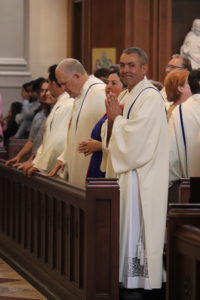 Every corner of the diocese will receive a new deacon, he noted.
Every corner of the diocese will receive a new deacon, he noted.
“They are getting spread out across the diocese, and they all have assignments to do,” Deacon Elliott said. “They’ve got lots going on. Every one of them is going to be participating in parishes across the diocese, and they have other things to do within those parishes as well. They got their orders today.”
All 23 men had their wives present for the ordination.
“They all did,” Deacon Elliott said, calling that fact “absolutely” a blessing. “They’ve been with them for this whole journey, along with their family, their kids, everything, so, yes, it’s a great blessing.”
Most of the new deacons studied for five and a half years, but some were in a discernment period for about six months before that, making the journey six years, Deacon Elliott said.
“I told them at the very beginning that this was going to be the fastest five and a half years that they ever went through, and I think if you ask them they’ll tell you that, and it was just as fast for me,” he said. “There’s two full years of Scripture that they study, and then they go into theology for about two years and then the practicum stuff for about a year and a half.”
Bishop Stika after Mass said there were about 1,200 people in the cathedral for the ordination.
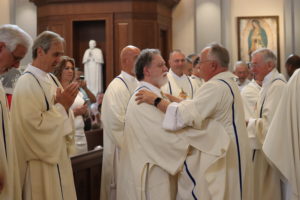 “All the parishes in one way or another seemed to be represented and from all the nooks and crannies of East Tennessee,” he said. “My life as a bishop, through apostolic authority, to be able to ordain is always a blessing.”
“All the parishes in one way or another seemed to be represented and from all the nooks and crannies of East Tennessee,” he said. “My life as a bishop, through apostolic authority, to be able to ordain is always a blessing.”
The diocese now has the deacon class of 2022 to go with those of 2007 and 2012, and it now has more than 100 permanent deacons.
“This is now our third class of deacons, and in that first class and even a couple in the second, guys are starting to retire,” the bishop said. “We’re going to be starting another class maybe in a year, so it’s just being replenished time and time again.”
Bishop Stika spoke of saying the prayer of ordination individually for 23 men.
“The laying on of hands is always significant because it’s so much a part of our ritual of ordinations and then the prayer of consecration and then watching them get vested, giving them the Gospel book—all of these things are very important and a real blessing for me to be able to be a part of the process,” he said.

